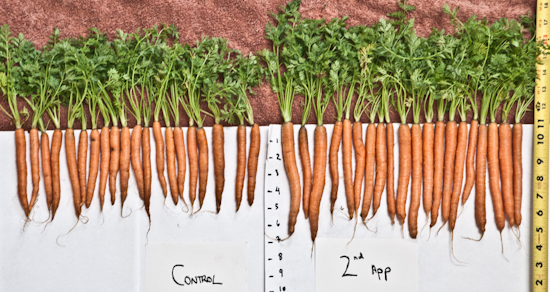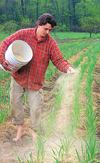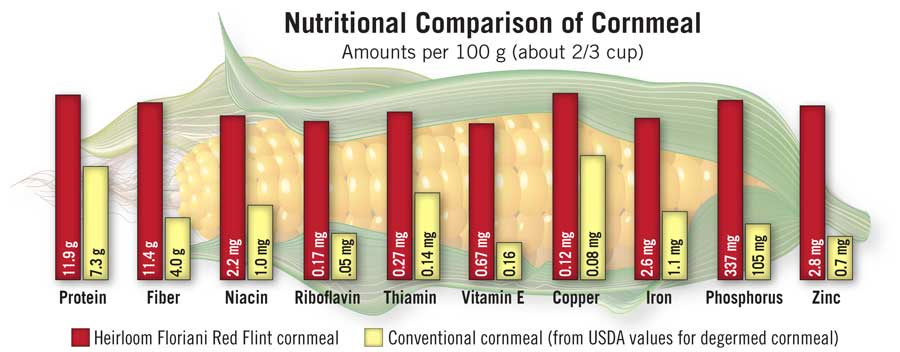Farmers Advancing Agriculture

The world record yield for paddy rice production is not held by an agricultural research station or by a large-scale farmer from the United States, but by Sumant Kumar who has a farm of just two hectares in Darveshpura village in the state of Bihar in Northern India. His record yield of 22.4 tons per hectare, from a one-acre plot, was achieved with what is known as the System of Rice Intensification (SRI). To put his achievement in perspective, the average paddy yield worldwide is about 4 tons per hectare. Even with the use of fertilizer, average yields are usually not more than 8 tons. Sumant Kumar’s success was not a fluke. Four of his neighbors, using SRI methods, and all for the first time, matched or exceeded the previous world record from China, 19 tons per hectare. Moreover, they used only modest amounts of inorganic fertilizer and did not need chemical crop protection.


 Though anything but a soils science expert, as a premed student some 25 short years ago and after a year as a farm intern, I felt I knew enough biology and farming to attempt a six-month bio-nutrient soils study on an organic farm. Jeffrey Colle' of Colle' Agriculture, green lit the project and David Retsky, owner of County Line Harvest Farm in Thermal, CA, provided the test plots for the six crops he was about to plant. Ignorance is bliss and little did I know what I was in for.
Though anything but a soils science expert, as a premed student some 25 short years ago and after a year as a farm intern, I felt I knew enough biology and farming to attempt a six-month bio-nutrient soils study on an organic farm. Jeffrey Colle' of Colle' Agriculture, green lit the project and David Retsky, owner of County Line Harvest Farm in Thermal, CA, provided the test plots for the six crops he was about to plant. Ignorance is bliss and little did I know what I was in for. Dan, in a wide-ranging interview with Alan Chartock on WAMC radio this June.
Dan, in a wide-ranging interview with Alan Chartock on WAMC radio this June.
 An inquisitive second-generation organic farmer named Dan Kittredge, 34, advocates moving beyond organic. He has put together and is popularizing a system for "Bionutrient-Rich Crop Production," often abbreviated as "nutrient-dense farming." His method strives to give plants all the nourishment they need to reach their full potential, a premise that makes sense intuitively, scientifically and in the field. The nutrient-dense approach explains how to achieve more robust, resilient and productive plants with crops of superior quality. Anecdotal evidence indicates that nutrient-dense crops are better equipped to fend off pests, compared to other plantings. Proponents also say that nutrient-dense produce is more flavorful, stores longer (and will dehydrate rather than rot) and contains much greater levels of vitamins, minerals and antioxidants than commonly found in today's foodstuffs.
An inquisitive second-generation organic farmer named Dan Kittredge, 34, advocates moving beyond organic. He has put together and is popularizing a system for "Bionutrient-Rich Crop Production," often abbreviated as "nutrient-dense farming." His method strives to give plants all the nourishment they need to reach their full potential, a premise that makes sense intuitively, scientifically and in the field. The nutrient-dense approach explains how to achieve more robust, resilient and productive plants with crops of superior quality. Anecdotal evidence indicates that nutrient-dense crops are better equipped to fend off pests, compared to other plantings. Proponents also say that nutrient-dense produce is more flavorful, stores longer (and will dehydrate rather than rot) and contains much greater levels of vitamins, minerals and antioxidants than commonly found in today's foodstuffs. Evidence continues to accumulate that our industrial food system is not serving us well when it comes to the nutrient value of food. True, American agribusiness has given us one of the cheapest food supplies in the world, but science reveals this food is "cheap" in more ways than one. Here are some of the things we know at this point...
Evidence continues to accumulate that our industrial food system is not serving us well when it comes to the nutrient value of food. True, American agribusiness has given us one of the cheapest food supplies in the world, but science reveals this food is "cheap" in more ways than one. Here are some of the things we know at this point...